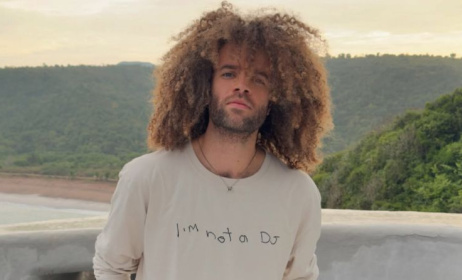Live music in Botswana
By Modirwa Kekwaletswe
This article provides an overview of live music in Botswana, from the post-independence (1966) period to the present day.
 Lister Boleseng, right, preforming live. Photo: Botswanaunplugged.com
Lister Boleseng, right, preforming live. Photo: Botswanaunplugged.com
Historical context
Following the discovery of diamonds in the country, Botswana’s economy grew enormously in the early years following independence, with community and school halls, hotels and stadiums springing up all over the country and providing venues for live music performances[1].
During the early 1980s, through the work of the Medu Art Ensemble, Botswana provided refuge for many South African musicians who were living in exile. The two outstanding artists among them – Hugh Masekela and Jonas Gwangwa – formed bands with local musicians. Masekela was backed by Kalahari, which included in its line-up White Kgopo and Banjo Mosele, while Gwangwa formed a backing band called Shakawe. With the infusion of this experience, talent and energy, Botswana – and especially its capital, Gaborone – enjoyed a thriving live music scene during this period, typified by the Botswana Festival of Culture and Resistance of 1982[2].
Although the country was greatly affected when South African Defence Force (SADF) commandos began to raid Botswana in 1986 in pursuit of members of the armed wing of the African National Congress, Umkhonto we Sizwe, it was able to maintain a vibrant live music scene during the era of cultural sanctions against South Africa. Gaborone hosted a number of live music concerts during this period, featuring international acts like Eric Clapton, Shabba Ranks and UB40[3].
The 1990s boom
A confluence of several important factors led to a boom in the Botswana live music scene in the 1990s. Technological advancements aided the recording, engineering and production of new music: the country's first record label, Eric Ramco Records, was established, the Botswana government introduced a highly influential youth-orientated radio station, Radio Botswana 2 (RB2), and Botswana’s middle class continued to grow steadily, creating a population that had disposable income to spend on attending live music events.
This organic growth within the music sector resulted in artists taking nationwide tours to promote their music. Usually, artists grouped together and presented themselves as a package bill on tour. Gospel artists Phempheretlhe Pheto, Mmereki Marakakgoro and Mpho Nakedi would tour together, as would kwasa kwasa artists Franco Lesokwane and Alfredo Mos. Traditional groups such as Culture Spears, Ekentolo and Triple R would do the same. This trend has been emulated by upcoming acts such as Vee, Wizards and Executedge.
On these tours, performed in community and school halls across the countryside, artists often act as promoters of their own shows. The shows are also promoted through radio shows and posters and, on rare occasions, via national newspapers, while the advent of social media has opened another avenue for artists to publicise their shows. While South African musicians still tend to draw bigger audiences, new regulations compel promoters to have local acts alongside their foreign counterparts at all live performances[4].
Lip-synching vs live bands
Botswana’s most popular live acts display a mixed approach when it comes to using backing tracks, lip-synching or traditional live instrumentation.
With the emergence of programmed music in the 1990s came lip-synching, a popular performance style for the pioneers of pop music in Botswana such as Tribal Monks, DJ Skizo, Third Mind, Executedge and Wizards.
This trend was followed by the next generation of traditional pop artists, such as Culture Spears, Matsieng and Dithakga Tsa Mmino, while hip hop, house and kwaito-kwasa artists also tend to lip-synch during live performances (Scar, ATI, Brown Sugar, Vee, Slizer, T.H.A.B.O., Mlesho and Charma Gal).
However, leading traditional pop group Machesa performs with live instruments, while for musicians playing in genres such as jazz, rumba, Afro-pop, reggae and rock, live instrumentation is the norm. Ndingo Johwa, Lister Boleseng, Banjo Mosele, Alfredo Mos, Franco Lesokwane, Steppin Razor and Nosey Road Band are all well-known acts that play with live instrumentation.
Government-funded festivals
Live music in Botswana has seen further growth in the past decade (2008-2019), and this has largely been driven by both by private and public sponsorship.
When president Ian Khama took office in 2008, he introduced the popular President’s Day Competitions, in which performers from across the country compete at regional and national levels. The annual competitions allow both new and established artists to enter, culminating with a grand finale in the capital Gaborone during the month of July. This initiative has also seen various government ministries, departments and parastatals increasingly include live music on the programme at events such as launches, open days and ceremonies[5].
The Ministry of Youth Empowerment, Sport and Culture Development also promotes live music through providing grants and other means of financial support to promoters. Maitisong Festival, the country’s biggest and longest-running music festival, began in 1987 and has traditionally been funded by the ministry as well as companies from the private sector. The festival is hosted at Maitisong Hall, purposefully built at Maru-a-Pula School in the capital city. It includes in its programme of activities live music, theatre, poetry and visual arts, and regularly features international acts alongside local performers[6].
Another government-aided live music event is the Gaborone International Music and Culture Week (GIMC), a weeklong festival held in the first week of September every year. This multi-discipline event brings together local and international artists, with some of the proceeds donated to deserving NGOs and charity organisations[7].
Private sector funding
In the past, the lack of venues to host top-end live music events suffocated growth in Botswana’s live music sector. However, this challenge is being resolved with the establishment of several sizable venues, such as Botswana Crafts, the Molapo Stanbic Piazza and the Gaborone International Convention Centre (GICC).
The development of these venues, as well as the growth of private sector initiatives, has resulted in more live music in the country. Mobile telephone providers Mascom, Orange and BTC invest heavily in the live music scene. Mascom sponsors the popular Mascom Live Sessions, held at Botswana Craft, which usually feature foreign artists supported by local acts. Salif Keita (Mali), Oliver Mtukudzi, Ringo, Zahara, Freshlyground, Selaelo Selota and Sipho 'Hotstix' Mabuse are some the international musicians who have performed at the Mascom Live Sessions[8].
Mascom also funded Boosta Bash, an end-of-year festival that ran for 10 years before it collapsed in 2013, while Orange continues to sponsor Letlhafula, a food and culture festival with live music. Hosted by Botswana Craft, the festival features mainly local performers working in the traditional pop and Afro-pop genres[9]. BTC (formerly beMOBILE) has also taken an active role in funding live music events, sponsoring the jazz-themed Ke Ya Rona Festival in Palapye and partnering with the Botswana Choral Music Association (BOCMA) to launch the National Choir Festival[10].
Finally, The Alliance Française hosts a day-long live music event known as Fête de la Musique each year, a free show where artists are invited to "play for fun, and not for payment"[11].
Resources and citations:
- [1] http://www.debeersgroup.com/en/reports/impact/country/botswana-and-cut-8/the-contribution-of-diamonds-to-Botswana-development.html
- [2] http://uir.unisa.ac.za/bitstream/handle/10500/18725/dissertation_durbach...
- [3] ibid.
- [4] http://www.sundaystandard.info/if-music-be-food-love-starve
- [5] http://www.dailynews.gov.bw/mobile/news-details.php?nid=27559&flag=
- [6] http://www.maitisong.org/about-us/
- [7] http://www.gimc.co.bw
- [8] https://tsena.co.bw/mascom-live-sessions-are-back
- [9] http://www.dailynews.gov.bw/news-details.php?nid=27946
- [10] http://www.dailynews.gov.bw/news-details.php?nid=1370
- [11] http://www.botswanaguardian.co.bw/style/item/3212-la-fete-de-la-musique-...
Disclaimer: Music In Africa's Overviews provide broad information about the music scenes in African countries. Music In Africa understands that the information in some of these texts could become outdated with time. If you would like to provide updated information or corrections to any of our Overview texts, please contact us at info@musicinafrica.net.
Editing by David Cornwell

































Comments
Log in or register to post comments